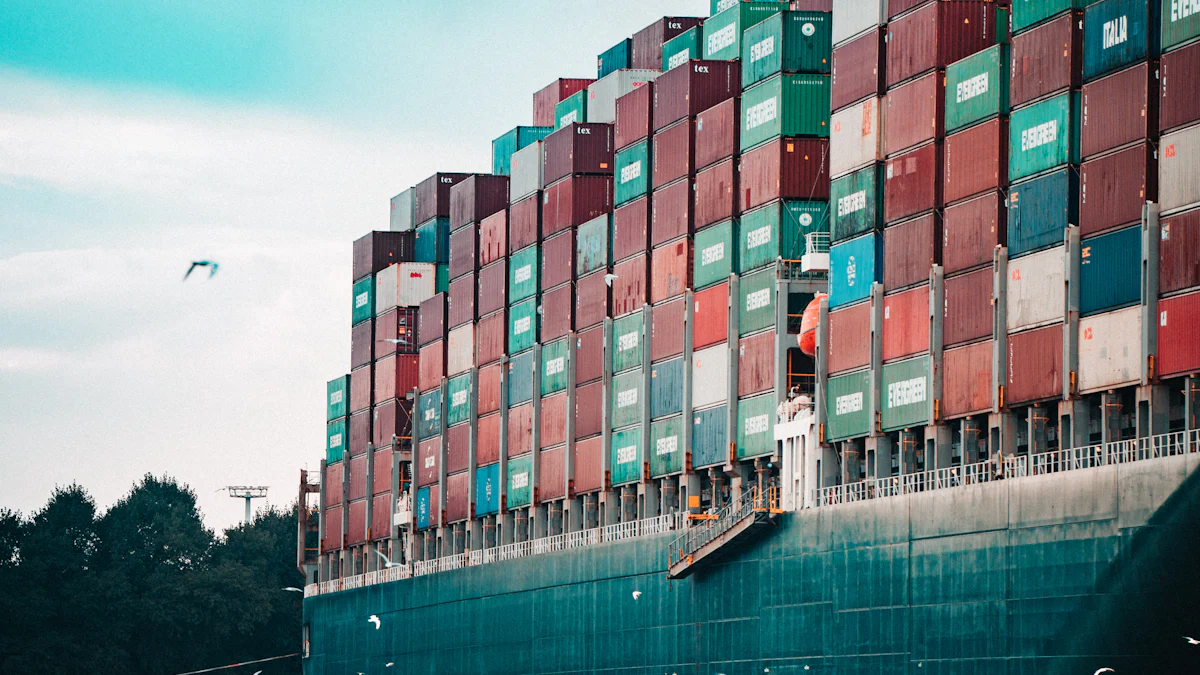The Next Frontier in Smart Supply Chains for High-Tech Manufacturing

High-tech manufacturing thrives on innovation. The smart supply chain plays a crucial role in this sector. Advanced technologies and real-time data optimize the transfer of goods from production to consumption. This results in cost savings and better inventory management.
The current state of smart supply chains showcases impressive visibility. Products move seamlessly from manufacturers to retailers. Predictive analytics enhance decision-making by detecting and monitoring issues. Adjustments happen swiftly, ensuring efficiency.
Emerging trends like AI, IoT, and blockchain are revolutionizing supply chains. These technologies bring unparalleled accuracy and efficiency. They streamline operations and improve overall performance.
Evolution of Smart Supply Chains
Historical Perspective
Early Automation
The journey of the smart supply chain began with early automation. In the mid-20th century, manufacturers started using basic machines to automate repetitive tasks. This shift improved efficiency and reduced human error. For example, the Inventory Management Assistant (IMA), designed in 1986, enhanced spare parts replenishment for the US Air Force. This innovation marked a significant step towards modern supply chain management.
Integration of IT Systems
The next major leap involved integrating IT systems. Companies began using computers to manage inventory and track shipments. This integration allowed for better data processing and communication between different parts of the supply chain. The ability to quickly access and analyze data led to more informed decision-making and streamlined operations. This period laid the groundwork for today's highly connected supply chains.
Recent Developments
IoT and Connectivity
Recent years have seen the rise of the Internet of Things (IoT) in supply chains. IoT devices provide real-time tracking of products, enabling companies to monitor shipments from start to finish. This connectivity ensures that any issues can be addressed immediately, reducing delays and improving overall efficiency. Real-time data helps companies predict product quantities and manage blockages effectively.
AI and Machine Learning
Artificial Intelligence (AI) and Machine Learning have revolutionized supply chain management. These technologies automate tasks and optimize processes. AI can predict demand more accurately, helping companies plan their inventory better. Machine learning algorithms identify patterns and trends, allowing for proactive problem-solving. The use of AI in supply chains has led to quicker responses to requests and increased resilience.
Key Technologies Driving the Next Frontier

Internet of Things (IoT)
Real-time Tracking
The smart supply chain relies heavily on the Internet of Things (IoT) for real-time tracking. Sensors and devices attached to products provide constant updates on their location. This allows companies to monitor shipments from start to finish. Real-time tracking helps identify delays and bottlenecks quickly. Companies can then take immediate action to resolve issues. This leads to smoother operations and better customer satisfaction.
Predictive Maintenance
Predictive maintenance is another vital aspect of the smart supply chain. IoT devices collect data on machinery and equipment. This data helps predict when maintenance is needed before a breakdown occurs. By addressing issues early, companies can avoid costly downtime. Predictive maintenance ensures that production lines run smoothly. This increases efficiency and reduces unexpected interruptions.
Artificial Intelligence and Machine Learning
Demand Forecasting
Artificial Intelligence (AI) and Machine Learning play crucial roles in demand forecasting. These technologies analyze vast amounts of data to predict future demand. Accurate demand forecasting helps companies manage inventory more effectively. Companies can stock the right amount of products, reducing waste and shortages. This leads to cost savings and improved customer satisfaction.
Supply Chain Optimization
Supply chain optimization is another area where AI and Machine Learning excel. These technologies identify patterns and trends in supply chain data. Companies can then optimize routes, reduce costs, and improve delivery times. Machine learning algorithms help solve complex problems quickly. This makes the smart supply chain more agile and responsive to changes. Companies can adapt to market fluctuations more efficiently.

Blockchain Technology
Transparency and Traceability
Blockchain technology offers unparalleled transparency and traceability in the smart supply chain. Every transaction gets recorded on a secure, immutable ledger. This provides a clear audit trail for all products. Companies can track the origin and journey of each item. This level of transparency builds trust with customers and partners. It also helps in identifying and resolving issues quickly.
Security and Fraud Prevention
Security and fraud prevention are critical benefits of blockchain technology. The decentralized nature of blockchain makes it highly secure. Each transaction gets verified by multiple nodes, making it difficult to tamper with data. This enhances the integrity of the smart supply chain. Companies can prevent fraud and ensure that products are authentic. This adds an extra layer of security to supply chain operations.
Benefits of Advanced Smart Supply Chains

Efficiency and Cost Reduction
Automated Processes
Smart supply chains leverage advanced technology to automate various processes. Automation reduces manual labor and minimizes errors. Machines handle repetitive tasks with precision. This leads to faster production times and lower operational costs. Companies can allocate human resources to more strategic roles. Automation ensures consistent quality and boosts overall productivity.
Reduced Downtime
Predictive maintenance plays a crucial role in smart supply chains. IoT devices monitor equipment in real-time. Data from these devices helps predict potential failures. Companies can schedule maintenance before breakdowns occur. This proactive approach reduces downtime significantly. Production lines run smoothly without unexpected interruptions. Reduced downtime translates to higher efficiency and cost savings.
Enhanced Decision Making
Data-Driven Insights
Smart supply chains generate vast amounts of data. Advanced analytics tools process this data to provide actionable insights. Companies can make informed decisions based on real-time information. Data-driven insights help optimize inventory levels. Businesses can avoid overstocking or stockouts. This leads to better resource management and cost efficiency.
Proactive Problem Solving
AI and machine learning enhance problem-solving capabilities in smart supply chains. These technologies identify patterns and anomalies in data. Companies can detect issues before they escalate. Proactive problem-solving ensures swift resolution of potential disruptions. Businesses can maintain smooth operations and meet customer demands effectively. This agility enhances the overall resilience of the supply chain.
Improved Customer Satisfaction
Faster Delivery Times
Smart supply chains improve delivery times through optimized logistics. Real-time tracking provides visibility into shipment status. Companies can adjust routes and schedules to avoid delays. Faster delivery times enhance customer satisfaction. Customers receive their orders promptly, leading to positive experiences. Efficient logistics also reduce transportation costs.
Customized Solutions
Advanced technologies enable smart supply chains to offer customized solutions. AI analyzes customer preferences and demand patterns. Companies can tailor products and services to meet specific needs. Customization enhances the customer experience. Businesses can build stronger relationships with their clients. Personalized solutions lead to higher customer loyalty and repeat business.
Challenges and Considerations
Implementation Costs
Initial Investment
Implementing a smart supply chain requires significant initial investment. Companies must purchase advanced technologies like IoT devices, AI systems, and blockchain platforms. These technologies can be expensive. The cost of integrating these systems into existing operations can also be high. Businesses need to budget carefully for these expenses.
Ongoing Maintenance
Maintaining a smart supply chain involves continuous costs. Regular updates and upgrades to software and hardware are necessary. Companies must allocate funds for these ongoing maintenance activities. Failure to do so can lead to system failures and inefficiencies. Proper maintenance ensures the smooth functioning of the supply chain.
Data Security and Privacy
Protecting Sensitive Information
A smart supply chain generates vast amounts of data. Protecting this sensitive information is crucial. Companies must implement robust cybersecurity measures. These measures include encryption, firewalls, and secure access controls. Unauthorized access to data can lead to breaches and financial losses. Ensuring data security builds trust with customers and partners.
Compliance with Regulations
Compliance with data privacy regulations is essential for a smart supply chain. Different regions have varying laws regarding data protection. Companies must stay updated on these regulations. Non-compliance can result in hefty fines and legal issues. Adhering to regulations ensures that companies operate within legal boundaries. This compliance also enhances the company's reputation.
Workforce Adaptation
Training and Development
Adopting a smart supply chain requires a skilled workforce. Employees need training to handle new technologies. Companies must invest in training programs. These programs should focus on the practical application of IoT, AI, and blockchain. Well-trained employees can maximize the benefits of a smart supply chain. Continuous development keeps the workforce updated with technological advancements.
Change Management
Implementing a smart supply chain involves significant changes. Companies must manage these changes effectively. Change management strategies help in smooth transitions. Clear communication about the benefits and processes is crucial. Employees should feel supported during the transition. Effective change management minimizes resistance and boosts morale.
The smart supply chain holds immense importance in high-tech manufacturing. Advanced technologies like AI, IoT, and blockchain drive efficiency and innovation. Companies benefit from real-time data, predictive analytics, and enhanced visibility.
Future developments will see a stronger fusion between physical and digital supply chains. This evolution will create more dynamic and automated operations. Industry experts believe interconnected systems will enable better decision-making and agility.
Industry stakeholders must embrace innovation. Investing in a smart supply chain ensures competitiveness and resilience. The future of high-tech manufacturing depends on it.
See Also
Efficient Strategies for Supply Chain Challenges in High-Tech Manufacturing
Guiding Efficient Logistics for High-Tech Manufacturing Triumph
Artificial Intelligence in Logistics: Transforming Future Supply Chains
Collaborative Innovation: Improving Supplier Partnerships in High-Tech Manufacturing
Discovering Robotics Innovation: Transforming Supply Chain Operations
